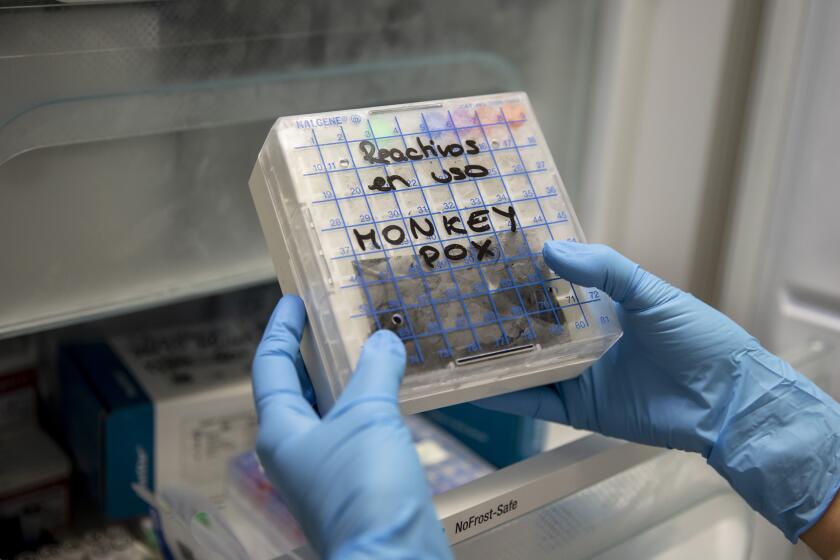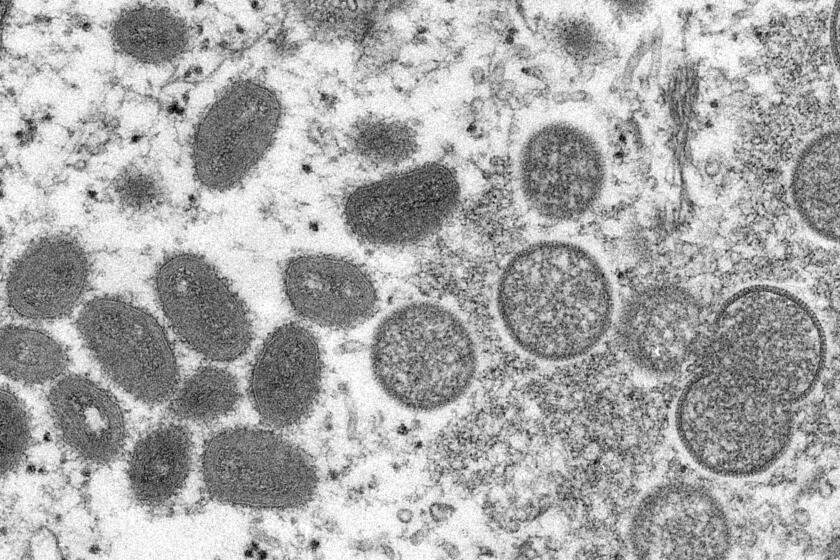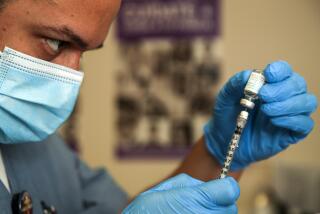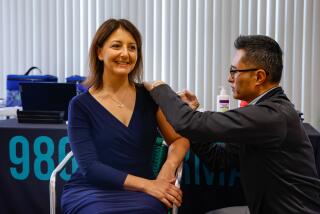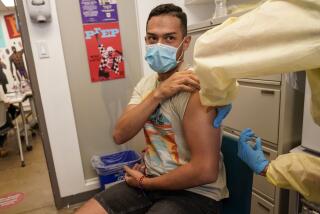Los Angeles County expands monkeypox vaccine eligibility, but stockpile still âextremely limitedâ
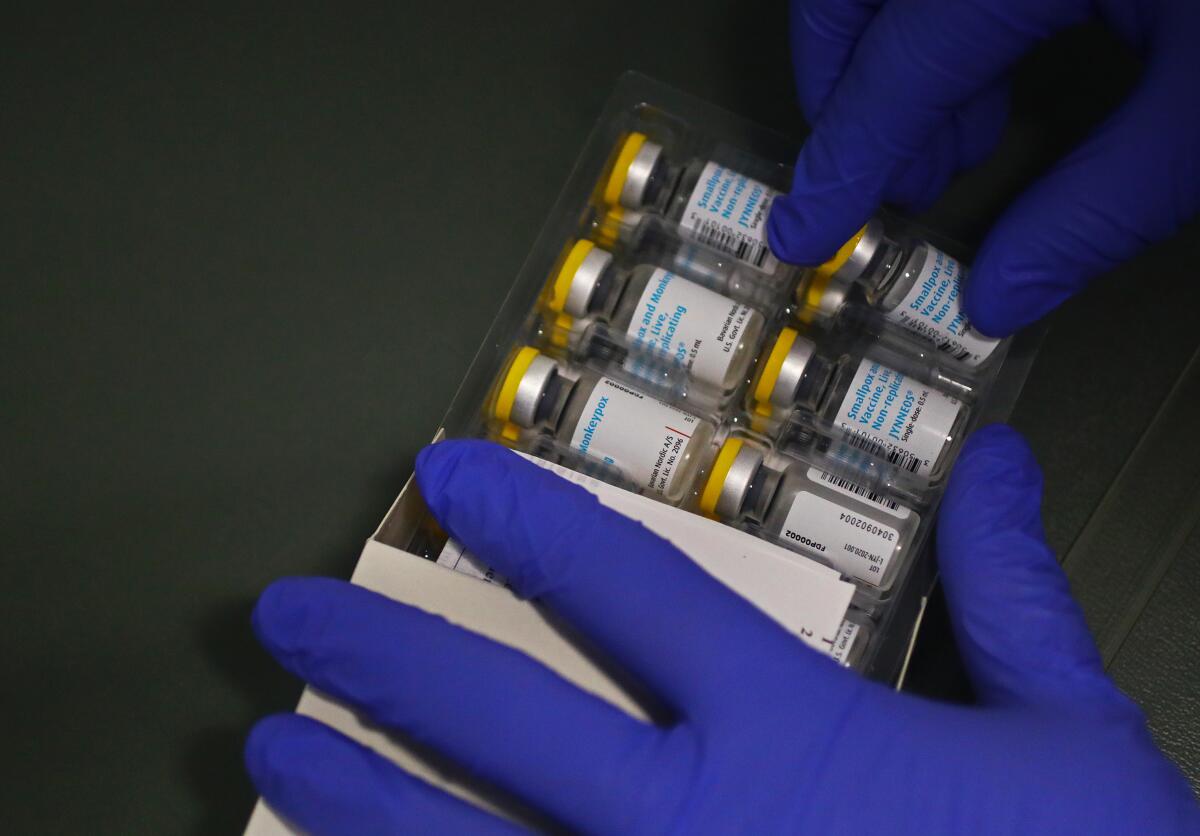
With almost 10,000 new monkeypox vaccines in hand and an additional 7,000 promised, Los Angeles County has again expanded eligibility requirements for the shot â although the availability still falls far short of being able to inoculate everyone at risk or interested in the protection.
âThe supply of Jynneos vaccine from the federal government has been, and continues to be, extremely limited,â said Andrea Kim, the countyâs director of vaccine-preventable disease control.
She said the new eligibility requirements, which include people who recently attended or worked at a commercial sex venue along with gay or bisexual men and transgender people who have certain sexually transmitted disease diagnoses, still follow state and federal guidelines to âprioritize those at higher risk.â
Kim said the outbreak in Los Angeles County continues to spread primarily among men who have sex with men and transgender people, mirroring how the virus is spreading in other cities and worldwide â though anyone can become infected.
Los Angeles County officials have reported limited local transmission of monkeypox, with some recent cases involving people who attended large events and infected people who havenât traveled out of state.
The number of monkeypox cases in L.A. County has doubled in the last week, with 120 confirmed or probable cases as of Tuesday, according to the Department of Public Health.
While the virus is still considered a low risk for the general public, LGBTQ leaders continue to sound the alarm about monkeypoxâs rapid spread among queer communities, and have called for a better and more comprehensive response to the virus.
Kim said Tuesday the county has received more than 17,000 doses of the Jynneos vaccine, which can be administered up to 14 days after an exposure. The county, however, has administered or distributed to local clinics only about a third of the current stockpile â 5,400 doses â she said. About 7,000 more doses are expected to arrive this week.
The vaccine is a two-shot series given about four weeks apart, and people are considered fully protected two weeks after the second dose, according to the CDC.
In addition to those who have had direct contact with a known monkeypox case or were at an event with a high-exposure risk â the groups eligible for vaccines since the virus was first confirmed in L.A. in late June â officials expanded eligibility to include those who have attended or worked at commercial sex venues or similar places that include anonymous sex with multiple partners in the last 21 days.
Some in the LGBTQ community are worried that the vaccine shortage will allow for spread of monkeypox.
For the record:
3:56 p.m. July 26, 2022A previous version of this story said patients receiving treatment for HIV are eligible for the monkeypox vaccine. The eligible group is people taking HIV pre-exposure prophylaxis medicine.
The new criteria also include gay or bisexual men and transgender people who have been diagnosed with gonorrhea or early syphilis in the last year. Previous guidelines required a diagnosis in the last three months. Also still eligible for the vaccine are people taking HIV pre-exposure prophylaxis medicine, known as PrEP.
The county also launched an online form to show the best way to receive the vaccine. Residents can call 211 to get information about monkeypox, including signing up for a vaccine.
Some experts say the WHOâs decision to act only after the disease spilled into the West could entrench the inequities that arose during the pandemic.
Monkeypox is primarily transmitted by skin-to-skin contact with someone who has a rash and pus-filled sores. It also can be transmitted through contact with virus-filled materials, such as bedding and towels, and potentially through close contact with respiratory droplets coming from an infected personâs mouth, nose and eyes.
Officials are urging those at high risk of exposure to check themselves and any sexual partners for signs of infection â such as rashes, bumps, blisters and pus-filled sores â and seek medical attention, if necessary. Other symptoms can include fever and headache, aches and swollen lymph nodes.
No one in the U.S. has died of monkeypox, and hospitalizations remain rare, but many men have reported severe pain from the lesions, and symptoms can last up to four weeks.
More to Read
Sign up for Essential California
The most important California stories and recommendations in your inbox every morning.
You may occasionally receive promotional content from the Los Angeles Times.
